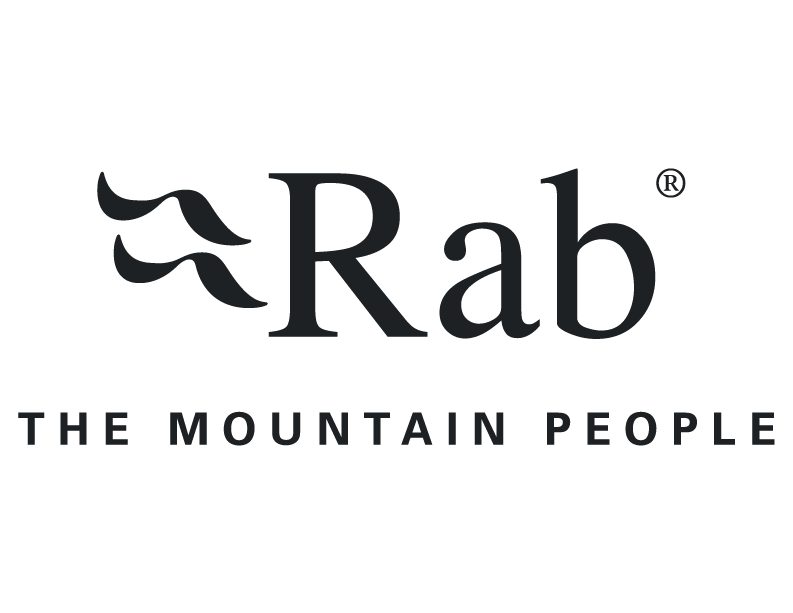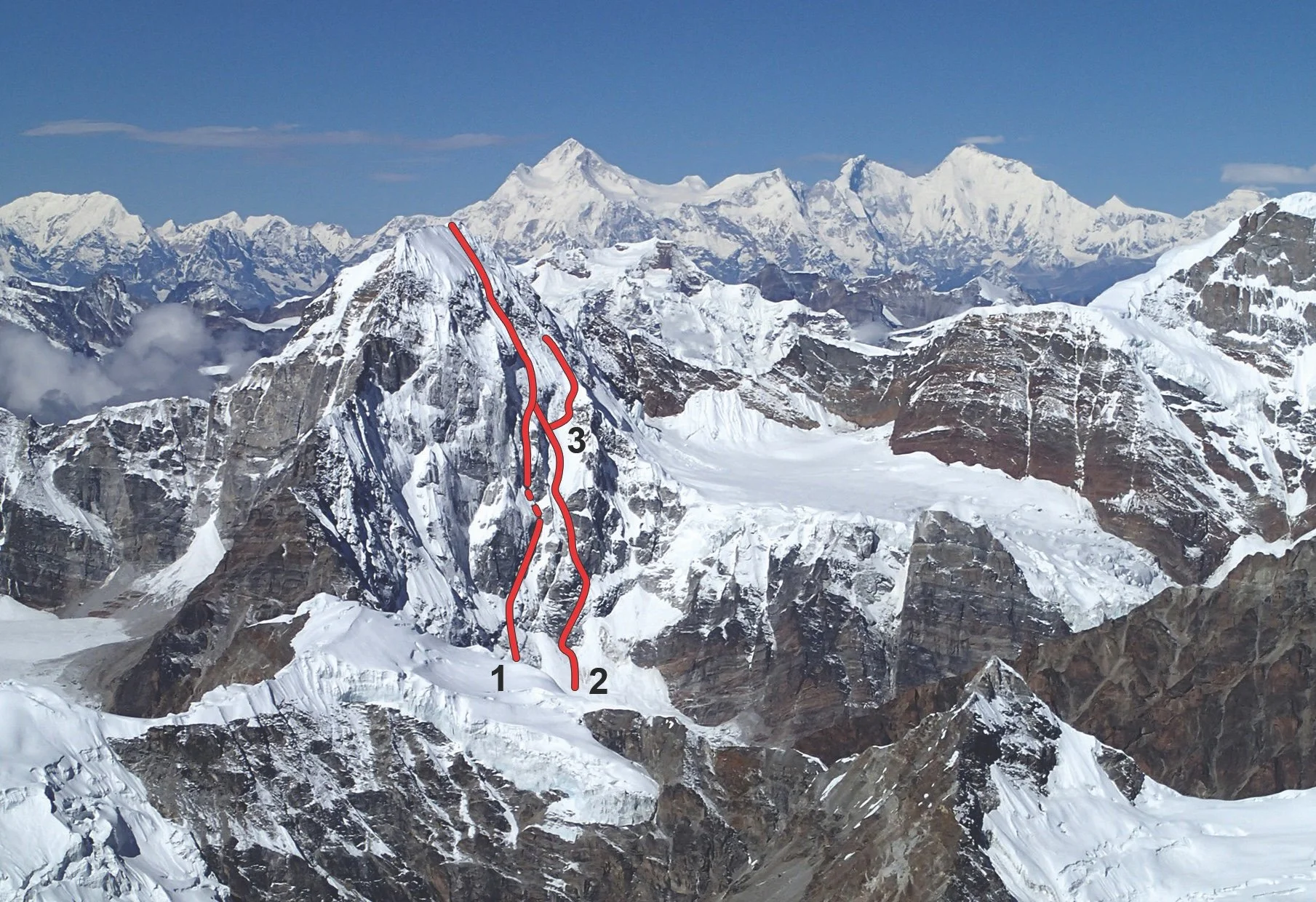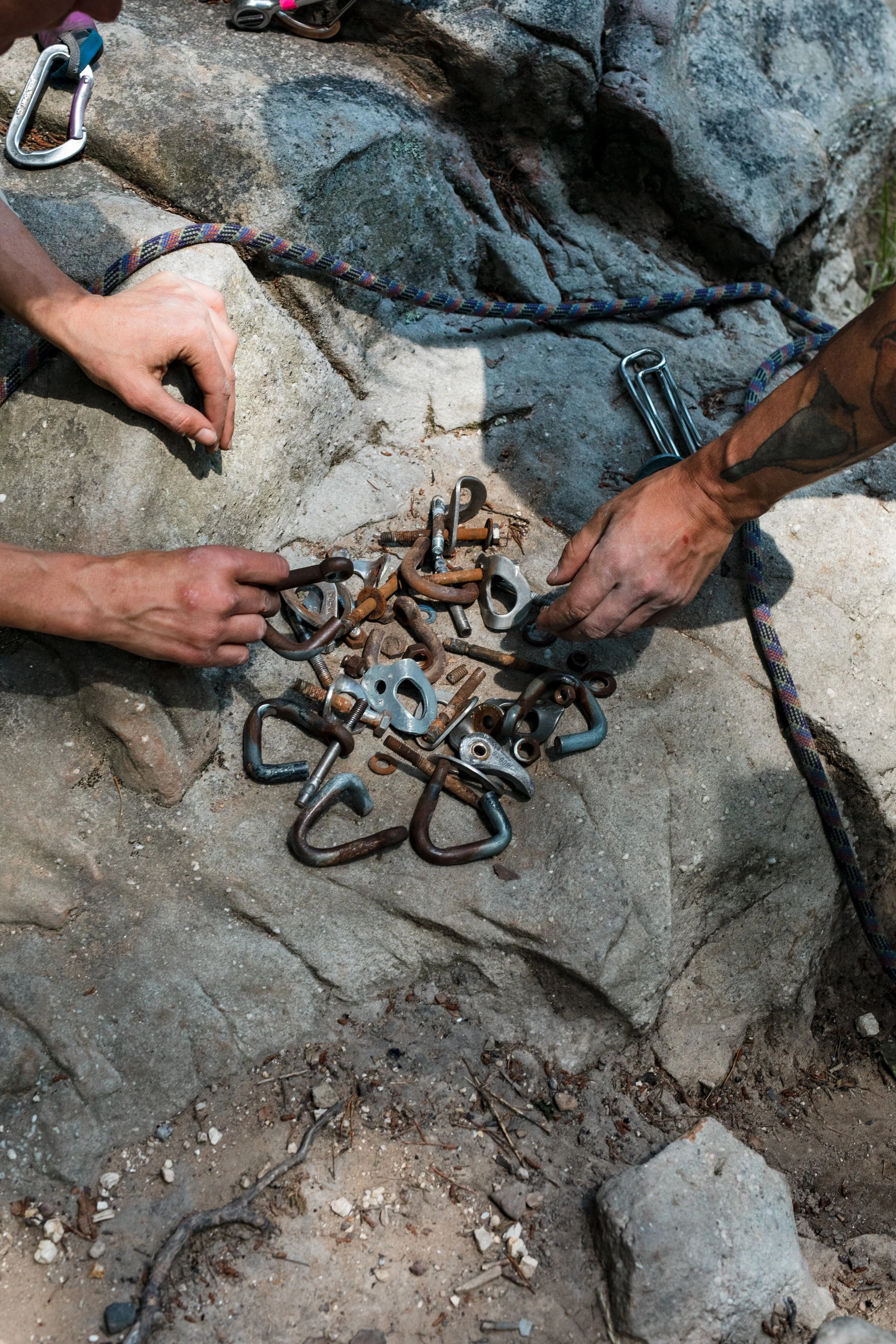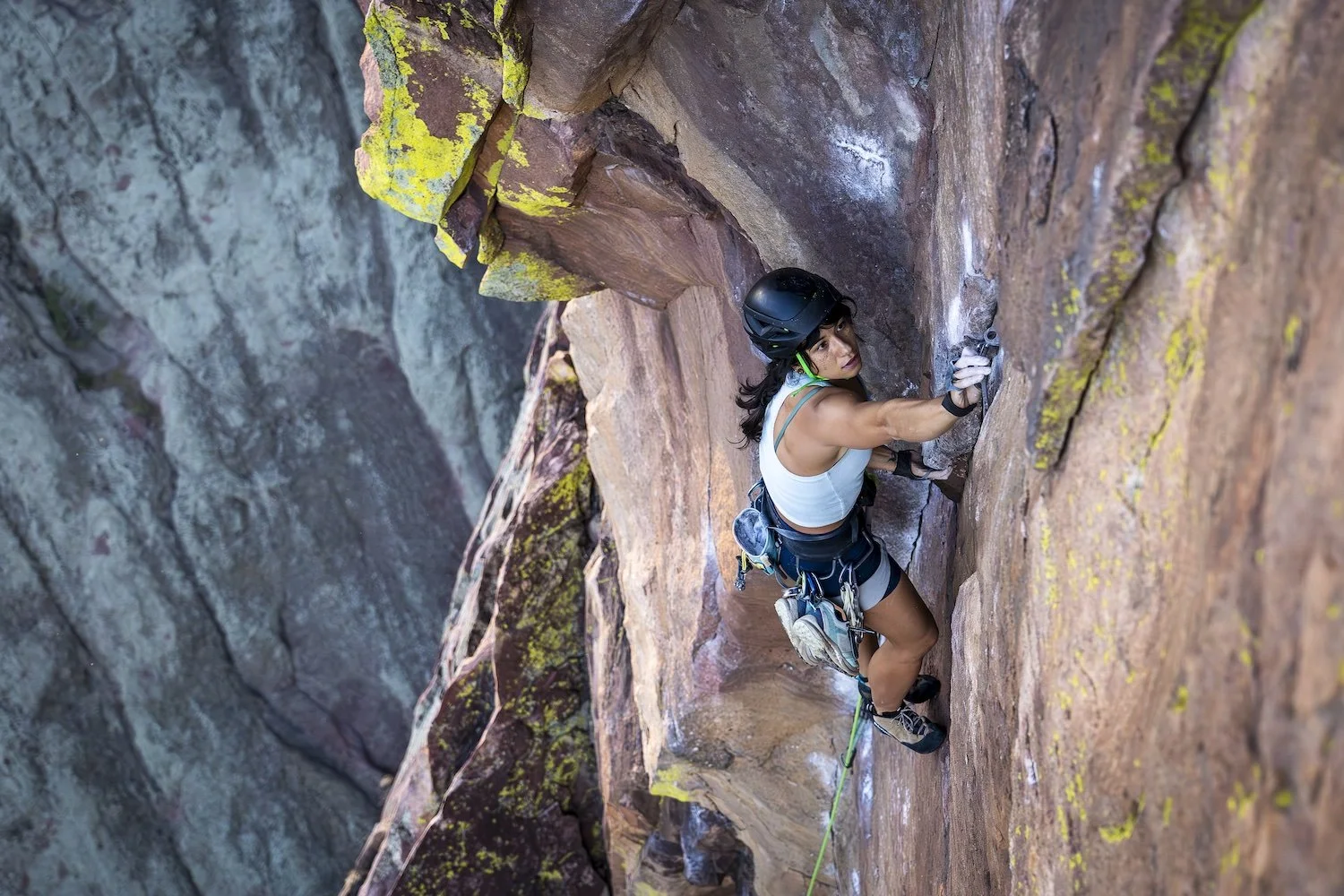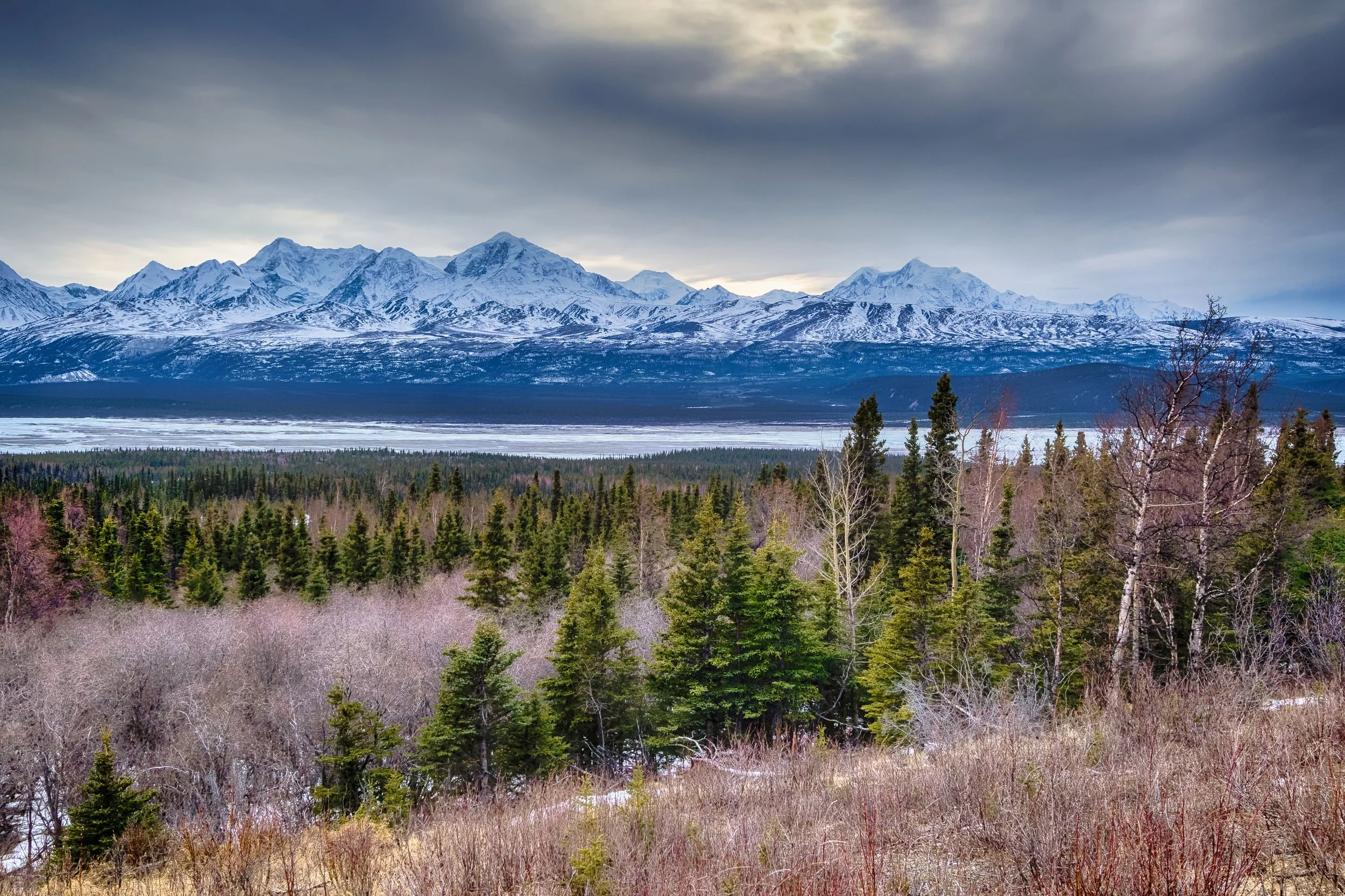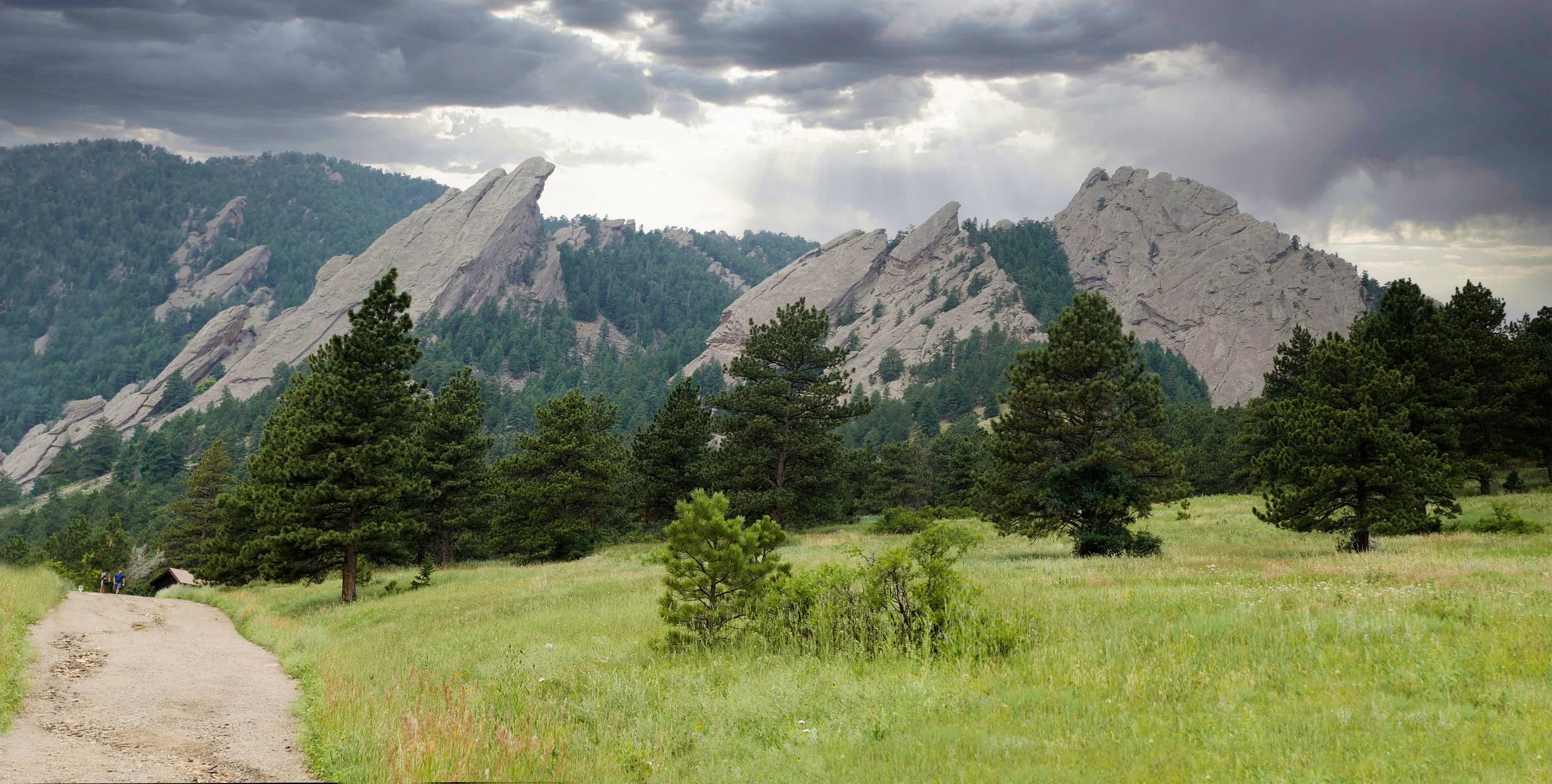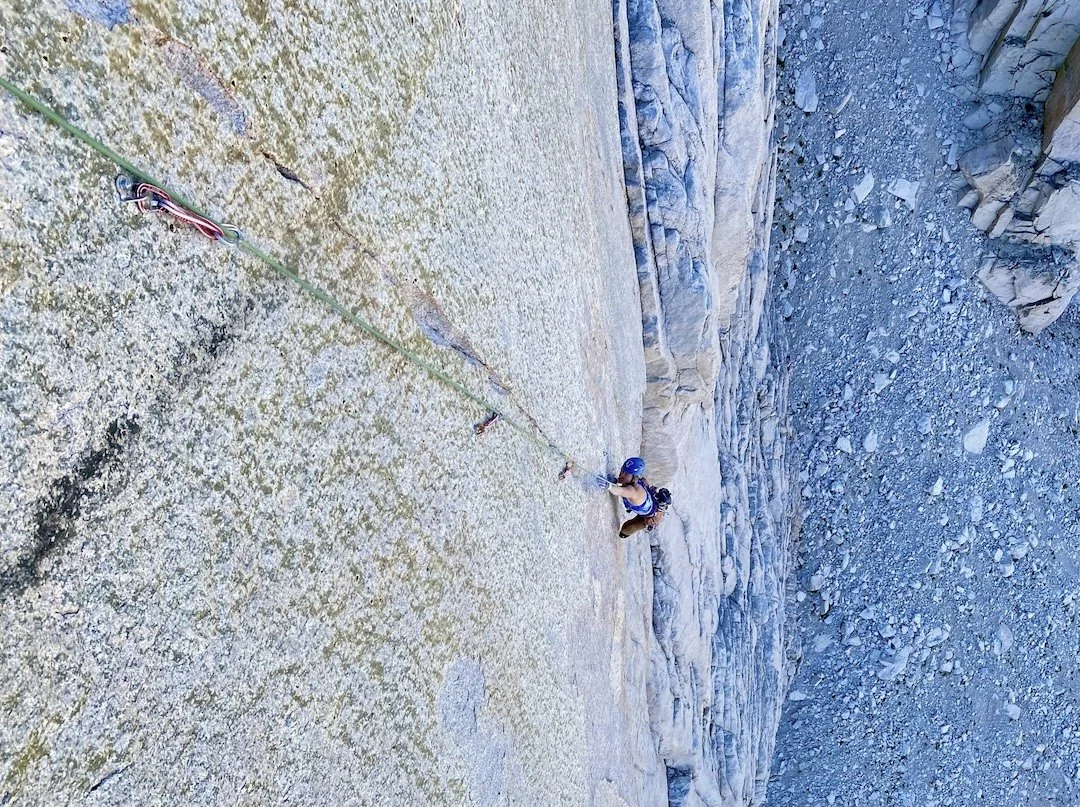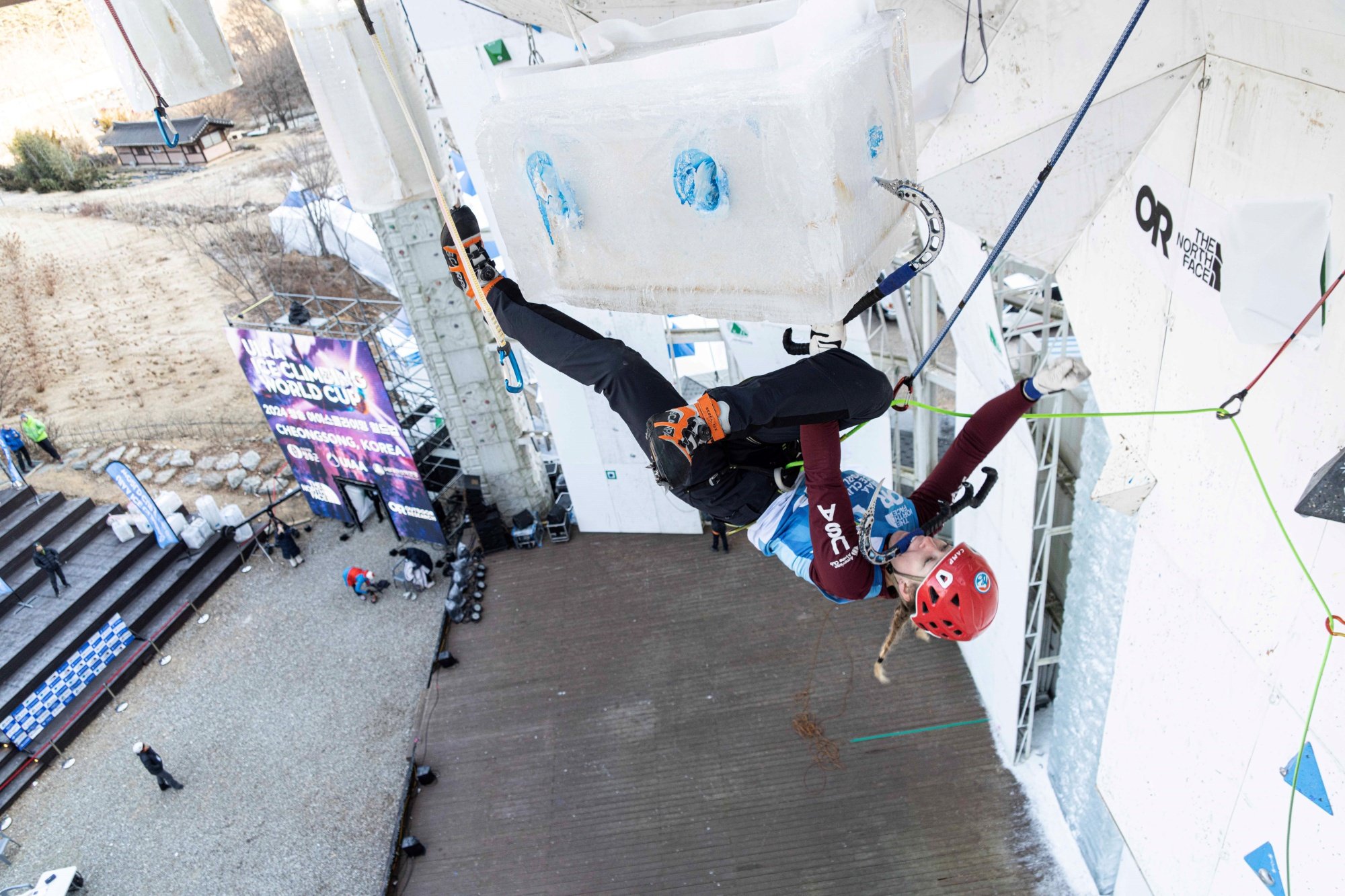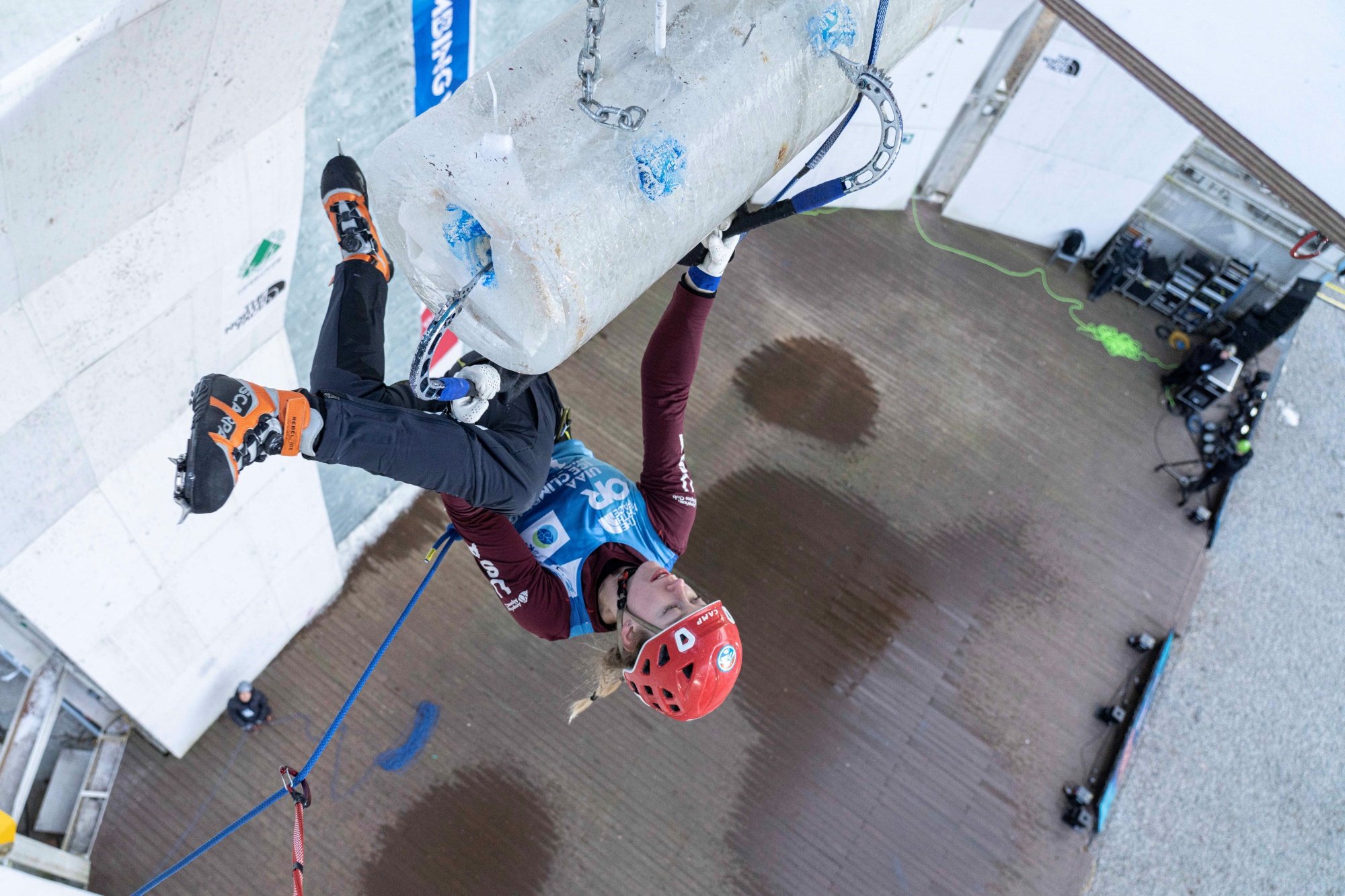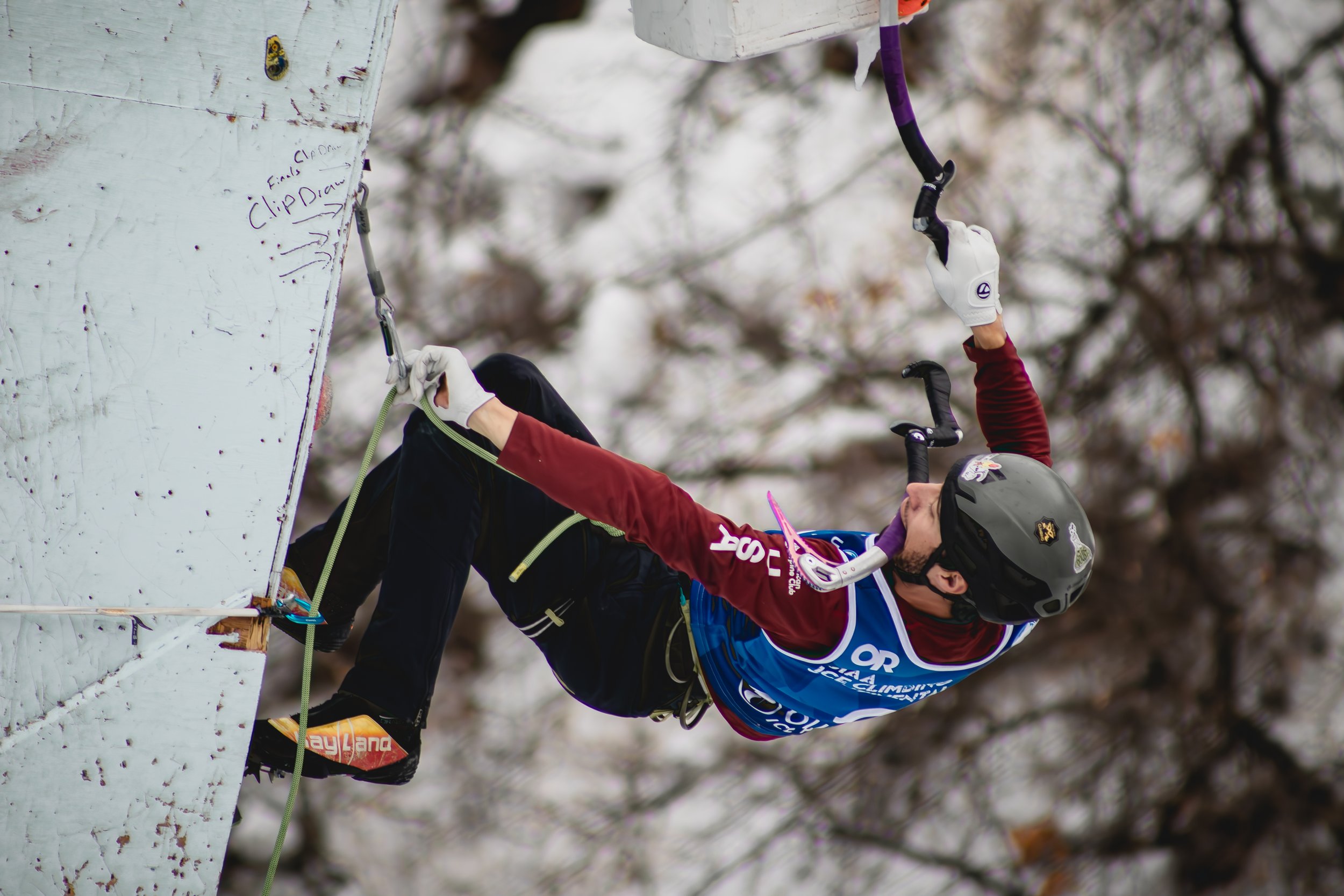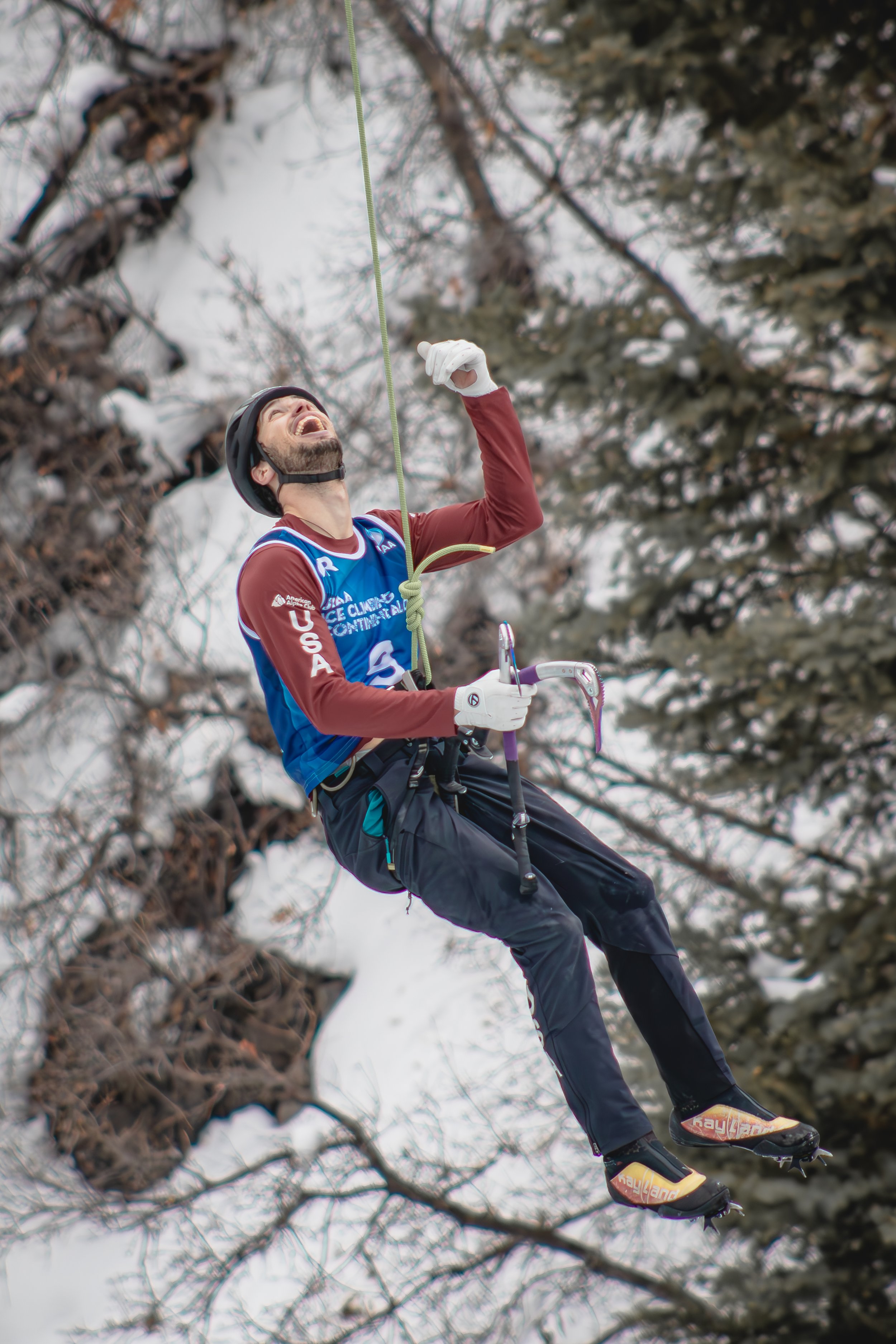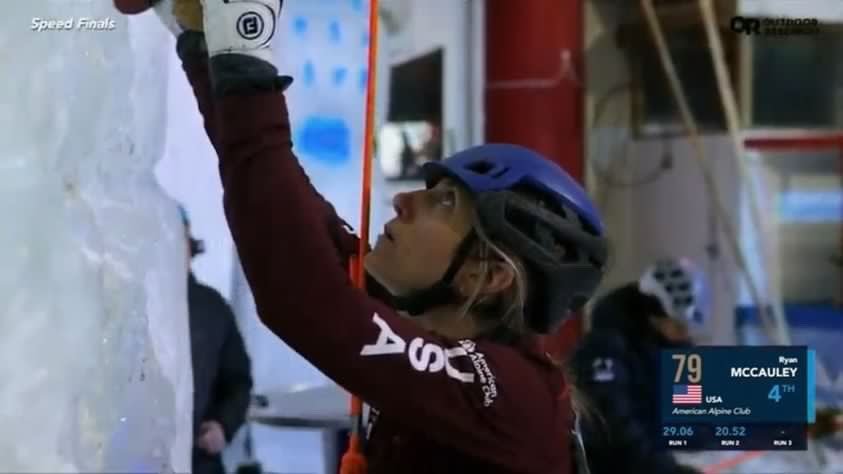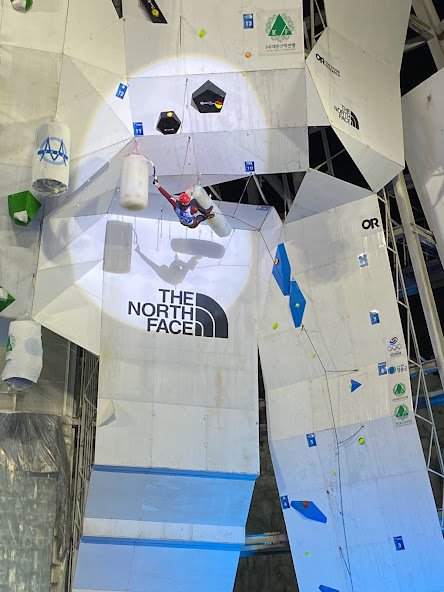Catalina Shirley during finals at Longmont. PC: Sierra McGivney
Photos and Story by Sierra McGivney
The intense winter sun bore down on Longmont's Ice Climbing World Cup stage in Colorado on February 22-23. For the first time since 2019, the United States hosted a UIAA Ice Climbing World Cup. The USA Ice Climbing athletes showed off figure fours and nines (similar to a figure four, but the climber wraps their leg over the same arm instead of the opposite), epic dynos into hanging hoops, and celebrated wins with views of Long's Peak in the background.
The warm weather led to thin ice, and an ice pick punctured a pipe, destroying one of the speed climbing walls Saturday night during the speed finals. As a result the format was changed from duel climbing to single. USA Ice climbing athletes Sam Serra and Catalina Shirley podiumed in speed despite the challenging ice conditions. Shirley took silver in speed with a time of 13.64.
Serra won his first-ever UIAA Ice climbing medal at Longmont, taking the bronze with a time of 9.07. Making the podium in speed was a "soft" goal for Serra in the Longmont World Cup.
"It's just been a steady progress all season," said Serra.
Lindsay Levine at Longmont. PC: Sierra McGivney
During the France World Cup, which was held from January 29 through February 1, Serra's left hand slipped, and he stabbed his thigh with his ice tool, needing three stitches. The past three weeks leading up to Longmont he was mainly focused on recovering in time for the competition.
Thanks to the Longmont Climbing Collective building a competition wall for the World Cup, the USA Ice Climbing team has been able to train all season in Longmont. Serra ran a weekly speed training night every Monday.
"I think everyone saw a lot of progress, and it's really rewarding to see that pay off, and everyone is performing super well this weekend and in the past World Cups," said Serra.
Donned in glitter, Sam Castro, Joann Dyer, Jessica Perez, and Alex Rudow bring their own personal style to competing.
"Glitter really makes me send hard," said Jessica Perez with a laugh. This is her third season on the USA Ice Climbing Team. She saw athletes competing in the World Cup in Denver in 2019 and dove into competition ice climbing headfirst.
Although doused in the same glitter, the four athletes had different goals for their seasons.
Roz Reynolds at Longmont. PC: Sierra McGivney
"It was my first season, so honestly, my only goal was not having a false start for speed and not stabbing myself, which I was very happy about," said Sam Castro. She achieved her goals this season.
"My goal is to enjoy the process and see how far I can test and push my limits and climb with confidence," said Jessica Perez.
Each athlete competes individually on the wall, but the USA Ice Climbing team is so tight-knit and supportive that it's almost a team sport.
"[Ice climbing competition] is so supportive, too, and it's like such a niche sport, I think. And it's growing. It's cool to be a part of a growing community and see the youth get really into it," said Joann Dyer.
Alex Rudow said, "I try to be supportive. The community is already so supportive. I have mainly competed in team sports, and this is probably my first individual sport. But despite that, you spend like nine times out of ten cheering on your teammates. It's awesome to see just how supportive everyone is." This is Rudow's first season on the ice team.
In the competitive world, mindset is everything. Seasoned competitor Ryan McCauley made a big mindset change this season. She went into the season wanting to be more playful and present on the wall.
Ryan McCauley at Longmont. PC: Sierra McGivney
"I think that in the past, I've tended to be really rigid and structured with my training. I've told myself this narrative: I just want to train really hard and get really strong, and then it can be really playful during competition season. And then I get there, and I'm like, why doesn't this feel playful? It's because I've related to it for months in a militant way," said McCauley.
Her main goal for the Ouray competition was to be more present, and it paid off when she podiumed and took third place. For logistical and financial reasons, McCauley decided to focus on the three competitions in North America: Ouray, Longmont, and Edmonton. At Longmont, McCauley fell early in qualifiers. She sees it as a testament to the finickiness of dry tooling, saying, "shit can happen."
"I can't control the outcomes, so I might as well savor the parts of the process that are meaningful," said McCauley.
Keenan Griscom During Finals at Longmont. PC: Sierra McGivney
On Sunday, energy was high through the semi-finals and finals. The USA Ice Climbing Team put their all into the semi-finals. Athletes and ice tools flew through the air while the crowd cheered. USA Ice Climbing athlete Catalina Shirley took center stage, topping the semi-final route. Keenan Griscom made it to the rodeo board, a semi-horizontal rocking piece of plywood with tiny holds, and moved on to finals. The competition was fierce on the wall, with all eyes on Shirley and Griscom during finals. Shirley placed fourth, and Griscom placed seventh.
The USA Ice Climbing Team operates as a team, supporting and cheering each other on through wins and losses. Ice climbing competitions can be unpredictable, but the team is steadfast.



Highlights from the 24/25 USA Ice Climbing Season:
The USA Ice Climbing Team Adult Team highlights:
Speed gold in Cheongsong, Korea - Catalina Shirley
Lead bronze and speed silver in Champagny-en-Vanoise, France - Catalina Shirley
Speed bronze in Longmont, USA - Sam Serra
Speed silver in Longmont, USA - Catalina Shirley
Lead silver in Edmonton, CA - Catalina Shirley
Overall World Tour speed silver medal - Catalina Shirley
Adult North American Lead Championship highlights:
Gold—Keenan Griscom & Catalina Shirley
Silver—Noah Bergman & Ryan McCauley
Bronze—Tyler Howe & Lindsay Levine
USA Youth Team highlights:
U16 lead and speed silver World Championship medals - Mathias Olsen
U16 lead silver and speed bronze World Championship medals - Nina Mankouski
U18 lead gold World Championship medal - Zoe Schiffer
U18 lead silver World Championship medal - Shelby Holmes
U20 lead bronze World Championship medal - Maple Damien
U16 lead gold Continental Cup in Sunderland, UK - Conner Bailey
The USA Youth Team finished second at the Ouray, USA World Championships in team rankings






